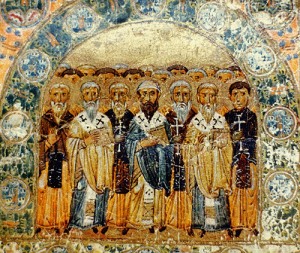 As God sees the world tottering to ruin because of fear, he acts unceasingly to bring it back by love, invite it by grace, to hold it by charity and clasp it firmly with affection.
As God sees the world tottering to ruin because of fear, he acts unceasingly to bring it back by love, invite it by grace, to hold it by charity and clasp it firmly with affection.
Hence, he washes the earth grown old in evil with the avenging flood.
He calls Noah the father of a new world, speaks to him gently and gives him kindly confidence.
He gives him fatherly instruction about the present and consoles him with good hope for the future.
He did not give orders but instead shared in the work of enclosing together in the ark all living creatures on the earth.
In this way the love of being together was to banish the fear born of slavery. What had been saved by a shared work was to be preserved by a community of love.
God calls Abraham from among the nations and makes his name great. He also makes him the father of those who believe, accompanies him on his journeys, and takes care of him among foreign peoples.
He enriches him with possessions, honours him with triumphs, and binds himself to him by promises. He snatches him from harm, looks after him hospitably, and astonishes him with a son he had given up hope of ever having.
All this he does, so that, filled with so many good things, and drawn by the great sweetness of divine love, Abraham might learn to love God and not to be afraid of him, to worship him by love, not by trembling in fear.
He comforts the fugitive Jacob in his sleep. On his way back he calls him to the contest and grasps him with a wrestler’s arms. This was to teach him to love and not to fear the father of the contest.
He invites Moses to be the liberator of his people, calling him with a fatherly voice and speaking to him father’s love.
The events that we have recalled where the hearts of men were fired with the flame of the love of God and their senses flooded to intoxication with that love, led them, wounded by love, to begin to want to look upon God with their bodily eyes.
How could the narrowness of human vision enclose God whom the world cannot contain?
The law of love has no thought about what will be, what ought to be or what can be. Love knows nothing about judgement, is beyond reason, and is incapable of moderation.
Love takes no relief from the fact that its object is beyond possibility, nor is it cured by difficulties. […] Love cannot bear not to have sight of what it loves.
Peter Chrysologus (c.380–c.450): Sermon 147; from the Monastic Office of Vigils, Thursday of the 2nd Week in Advent, Year 2.








